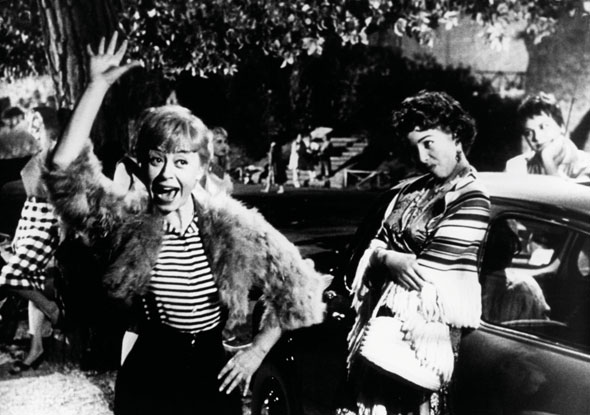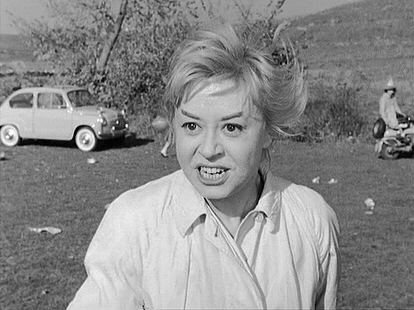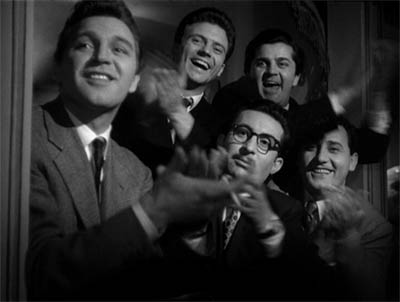
SECOND CHANCES
christopher funderburg
NIGHTS OF CABIRIA
Despite their reputations, some films and filmmakers just don't do it for Funderburg and Cribbs. This series, Second Chances, follows their attempts to find greatness where they've previously failed to see it; to actively make an effort to appreciate esteemed artworks for which they currently have a distaste (or feel indifference). They'll give cult favorites like A History of Violence another shot and dig deep in the filmographies of beloved auteurs whose appeal baffles them (like Nicholas Ray) - and with a little luck, maybe they'll even end up as newly-minted fans...
The subject: Nights of Cabiria.

Initial resistance:
I originally saw Nights of Cabiria back in July of 1998 when Rialto films did their re-release of the restored version. I had recently completed my freshman year of college and, being an 18-year old, had strong inflexible opinions about everything, especially le cinema. And folks with strong, inflexible opinions have made it their hallmark to divide the world up into pointless dichotomies, intensely partisan conflicts about things which you must either be for or against - and if you are for one thing, you are certainly against the other. I was no different and, I am sure you will be thrilled to hear, the pointless dichotomy relevent for this essay is Fellini versus Antonioni. I had recently come around on Antonioni (because I was in love with a girl who liked to cry during his films) and the desolate, minimalist interiority of Michaelangelo Antonioni's work could easily be pitted in battle of cinema against the flamboyant, maximalist melodramatics of Italian cinema's other titan, Federico Fellini. Having been recently underwhelmed by the noisy pomposity of La Dolce Vita and 8 & 1/2 made it easy for me to pick sides. Who could argue that the bloated, self-indulgent, plot-heavy, caricatured works of Fellini could compare to the aesthetically challenging, philosophically weary emotional angst of Antonioni. Being 18 years-old: "emotional angst" and "aesthetically challenging" are automatically positive attributes.
At the time, Fellini seemed to me to represent the height of contemptible pseudo-art pandering: silly melodramas slathered in manipulative music, fancy costumes, exotic locations and "meaningful" themes like religious yearning and the True Nature and Importance of Art. To me, Fellini seemed a crass carnvial barker all too happy to give his audience whatever they wanted, all gussied up in designer dresses framed by Italian vistas. Antonioni's relentless obscurity and willingness to alienate his audience (alienation is more or less his constant theme and obsession, to boot) made him seem to my young mind obviously a true artist. A pointless dichotomy. An easy choice. Obscurity equals genius. Pleasing a crowd assumes artistic cowardice. In retrospect, it's not exactly clear why I went to Lincoln Plaza to catch the re-release of Fellini's "prostitute yearning for redemption" fan favorite, but the fact is that I have never been too choosy with what I'll buy a ticket for. I'm sure it was starting at the right time or I had an afternoon to kill or I've always been a completist with the classics (even the ones I know I'm going to hate.) For whatever reason, I bought a sandwich at the cafe next door (as was my stees) and hopped the escalator down to Dan Talbot's subterranean cinema Mecca.
 I can tell you, I remember not being impressed as I stood in the lobby reading about the re-release of the film and how the censored "man with a sack" sequence had finally been restored after being unseen by any audience since the film's Cannes premiere in 1957. The infamous, shocking scene followed a man with a sack distributing food and clothes to poor people living in caves on the outskirts of Rome. The Catholic Church objected because of the implication that they weren't doing their job taking care of the destitute and needy. If a man with a sack is needed to help the poor, then the Catholic Church is falling down on the job, clearly. Quite frankly, the sequence sounded stupid and, still filled with a youthful rage at religion (Catholicism in particular), I saw Fellini's willingness to remove the scene as a confirmation of his cowardice and pseudo-artistry. Real artists like Diderot and Rabelais battled the church over their vision in a time when doing so could've resulted in their execution. A full decade after Kenneth Anger had popularized his gay sailor, Christmas-tree rape fantasies, Fellini made an "art" film but took out a scene because it didn't depict the Catholic Church in a flattering enough light for their tastes. Give. me. a. fucking. break.
I can tell you, I remember not being impressed as I stood in the lobby reading about the re-release of the film and how the censored "man with a sack" sequence had finally been restored after being unseen by any audience since the film's Cannes premiere in 1957. The infamous, shocking scene followed a man with a sack distributing food and clothes to poor people living in caves on the outskirts of Rome. The Catholic Church objected because of the implication that they weren't doing their job taking care of the destitute and needy. If a man with a sack is needed to help the poor, then the Catholic Church is falling down on the job, clearly. Quite frankly, the sequence sounded stupid and, still filled with a youthful rage at religion (Catholicism in particular), I saw Fellini's willingness to remove the scene as a confirmation of his cowardice and pseudo-artistry. Real artists like Diderot and Rabelais battled the church over their vision in a time when doing so could've resulted in their execution. A full decade after Kenneth Anger had popularized his gay sailor, Christmas-tree rape fantasies, Fellini made an "art" film but took out a scene because it didn't depict the Catholic Church in a flattering enough light for their tastes. Give. me. a. fucking. break.
But still, I went. I didn't hate it. I didn't like it. I found Guilietta Masina's central performance as the prostitute Cabiria/Maria to be irritating. She mugs and yells and gesticulates like she's going to get some kind of award if she's just shrill and over-the-top enough. Which she did: Masina won the Best Actress award at Cannes, but my main memories are of her doing a bad Charlie Chaplin impression or shouting, shouting, shouting at everybody in as brusque a manner as possible. The rest of the film was typically "Fellini-esque" with long cacaphonous scenes of groups of people yelling over each other while music blares at top volume and inconsequential emblems of religion and redemption are tacked on like self-congratulatory merit badges. I found the "man with a sack" scene to be every bit the pile of bullshit I assumed it would be: the sentimental scene of the noble do-gooding itself, the Church's puzzlingly indignant reaction, Fellini's spinelessness - spinelessness made all the more contemptible in light of the fact that it was such a sentimental, benign scene. If the assessment wasn't already set in my mind, Nights of Cabiria decisively nailed Fellini shut in a coffin labeled "over-rated." I never bothered with too much of his work after that. The full list of Fellini films I saw up until I Vitelloni's re-release went: La Dolce Vita, 8 & 1/2, La Strada, Juliet of the Spirits, Nights of Cabiria. Cabiria closed the casket and I never had the urge to open it.
Reasons for reassessment:
 There are 2 reasons, essentially pointed in opposite directions. The first, is that unlike many of the pointless dichotomies of my youth that I overcame, I never fully recovered from my anti-Fellini partisanship. I've let go of almost all of the righteous anger that fueled my youth and now rather than enthusiastically rush in with a wet blanket, I'm more likely to feel disappointed to be left out when everyone raves about a particular film or director that leaves me cold. I have no real interest in convincing anyone that they shouldn't like something that they do - even when I truly loathe a film, I'm usually indifferent to those sort of partisan struggles. I'd rather figure out what I'm missing or how I'm wrong, especially with a giant of the medium like Fellini than waste my time trying to tear down a reputation on which I will not realistically ever have any effect. Furthermore, there's obviously room for both Fellini and Antonioni in this world and one thing's got nothing to do with the other. When I Vitelloni was re-released a few years ago, I enjoyed it as an entertainment and the troubling aspects of Fellini's artistic persona didn't bother me (as much.) I felt like I hadn't bothered to revisit (or even visit) much of Fellini's work and my opinions on him were more or less the same ones I had developed after seeing La Dolce Vita and 8 & 1/2 in high school. So, yeah... that's embarrassing. I've spent a long time with my knee-jerk animosity for Fellini and even as I checked out more of his work after I saw I Vitelloni, I never made any effort to reassess the towering classics and overcome my Federicophobia.
There are 2 reasons, essentially pointed in opposite directions. The first, is that unlike many of the pointless dichotomies of my youth that I overcame, I never fully recovered from my anti-Fellini partisanship. I've let go of almost all of the righteous anger that fueled my youth and now rather than enthusiastically rush in with a wet blanket, I'm more likely to feel disappointed to be left out when everyone raves about a particular film or director that leaves me cold. I have no real interest in convincing anyone that they shouldn't like something that they do - even when I truly loathe a film, I'm usually indifferent to those sort of partisan struggles. I'd rather figure out what I'm missing or how I'm wrong, especially with a giant of the medium like Fellini than waste my time trying to tear down a reputation on which I will not realistically ever have any effect. Furthermore, there's obviously room for both Fellini and Antonioni in this world and one thing's got nothing to do with the other. When I Vitelloni was re-released a few years ago, I enjoyed it as an entertainment and the troubling aspects of Fellini's artistic persona didn't bother me (as much.) I felt like I hadn't bothered to revisit (or even visit) much of Fellini's work and my opinions on him were more or less the same ones I had developed after seeing La Dolce Vita and 8 & 1/2 in high school. So, yeah... that's embarrassing. I've spent a long time with my knee-jerk animosity for Fellini and even as I checked out more of his work after I saw I Vitelloni, I never made any effort to reassess the towering classics and overcome my Federicophobia.
The second reason is that I've become very interested in the relationship between the French New Wave critics and Roberto Rossellini. As I outlined in my article about Godard and Truffaut's "Top 10 Films of 1957," the New Wave critics' assessment has completely colored the critical view of Rossellini and I find both the New Wavers and Rossellini to be essentially dishonest about their politics and what they were trying to accomplish with their films. As Rossellini's screenwriter on key films like Open City and The Flowers of Saint Francis, Fellini is another piece of the puzzle. Interestingly (to me - ok?), Fellini is generally seen as being essentially apolitical, with a smattering of Catholic themes "naturally" finding their way into his work because he's an Italian or something along those lines. I haven't re-viewed any of Fellini's films through the new critical lens with which I've been futzing and I was curious whether his films add to my distaste for Rossellini (or more precisely, poke more holes in the consensus critical view of Rossellini that I find to be obnoxious nonsense.) Furthermore, in researching Rossellini, I found out that Fellini had been a member of Mussolini's Avanguardista, essentially the Italian Fascist version of Hitler Youth. For a filmmaker so frequently seen as (at worst) apolitical, I was curious just how his past manifested itself in his work, if at all. So part of me wanted to see just how wrong I was about Fellini, while an equal and opposite urge sought to explore his conveniently over-looked relationship to Italy's Fascist history.
<<Previous Page 1 2 Next Page>>
home about contact us featured writings years in review film productions
All rights reserved The Pink Smoke © 2011